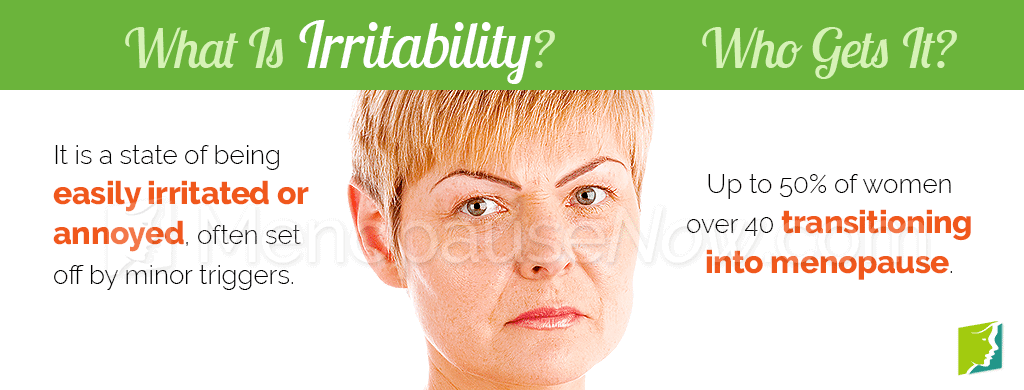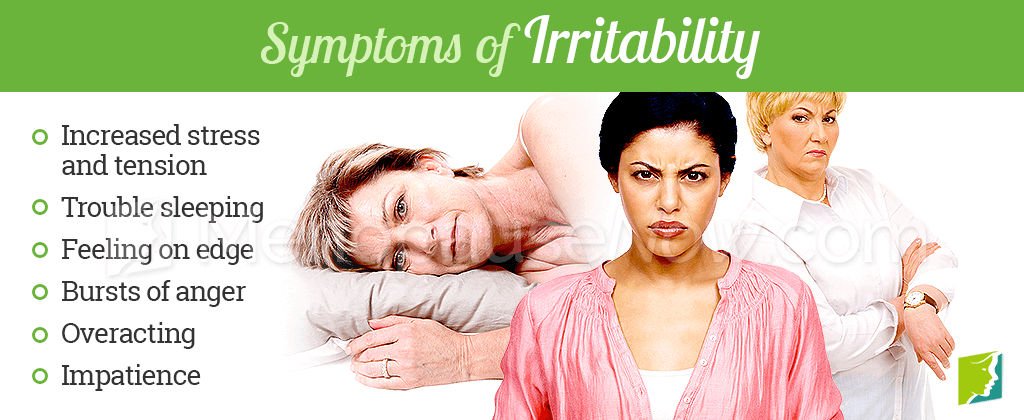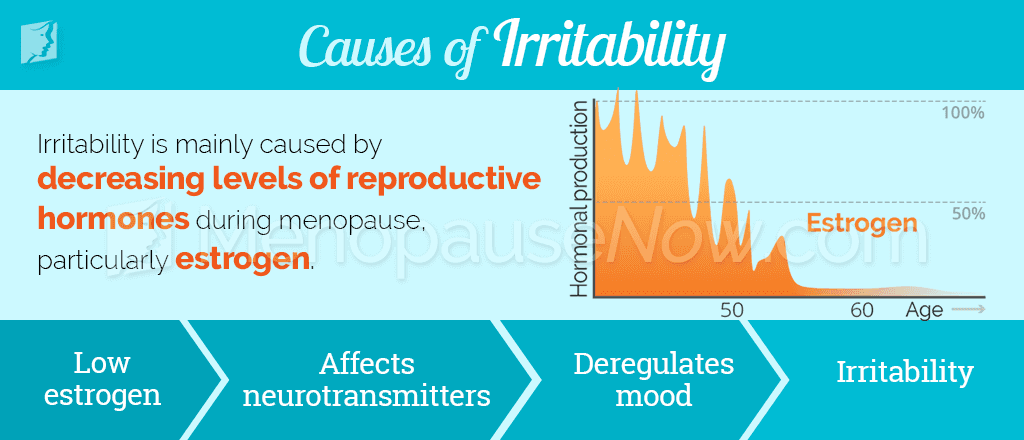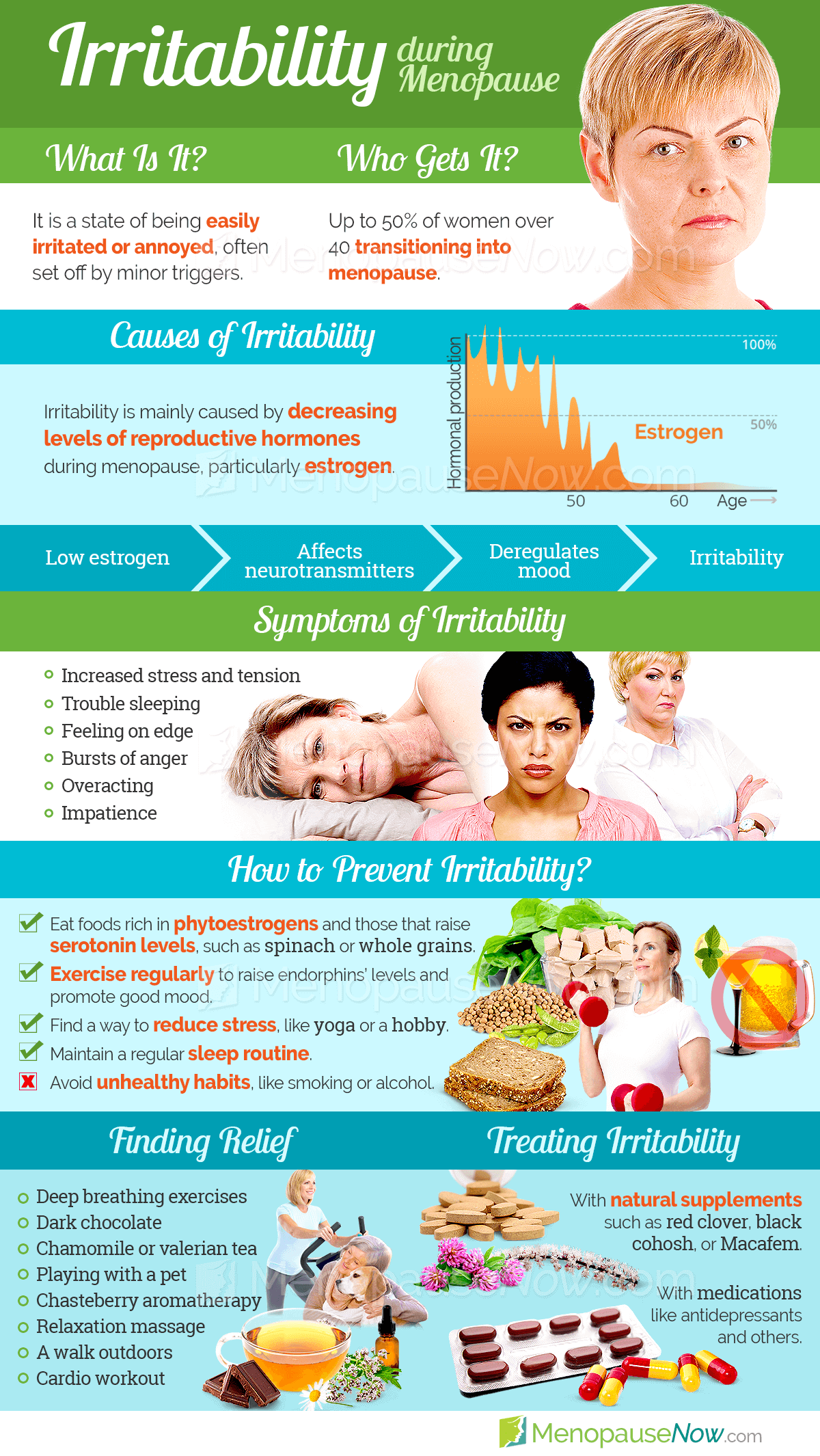In addition to a myriad of physical effects, emotional symptoms are common during menopause. In fact, up to 50% of all perimenopausal women experience disturbances in mood, including irritability. While several factors can contribute to irritability in day-to-day life, hormonal fluctuations during menopause are often the prime cause of irritability.
One of the most important things to remember is that irritability can be a normal part of the menopausal process. Many women find it helps to learn more about irritability during menopause, because a greater understanding of its symptoms and causes can help determine the most appropriate way to manage irritability and mitigate its effects.

About Irritability
Irritability is defined as an excessive response to stimuli. Many menopausal women find that they are more easily irritated by the daily stresses and strains of life than they once were. They understand that their reactions may be out of proportion to their triggers, but still have difficulty avoiding irritability.
Symptoms of Irritability
- Increased stress
- Trouble sleeping
- Feeling on edge
- Lashing out in anger or frustration
- Less tolerance for people and events
- Reduced patience
- Overreacting in situations
While most women know the signs and symptoms of irritability, they may be unaware of its underlying causes. Read on to learn more about the possible causes of irritability.

Causes of Irritability
During the menopausal transition, the primary underlying cause of irritability is hormonal imbalance. During menopause, fluctuating estrogen levels have a direct, though complex, effect on the brain's regulation of mood and emotion. Thus, changing levels of estrogen in the body can increase the risk of experiencing irritability during menopause.
Menopause-related hormonal changes can also indirectly trigger irritability. Other menopause symptoms - such as hot flashes, sleep disorders, loss of libido, vaginal dryness, and more - can cause or contribute to irritability.

In addition to natural hormonal changes in menopause, certain lifestyle and medical factors can trigger irritability.
Now that the causes of irritability are better understood, the next step towards managing this common symptom of menopause is learning more about treatment options. Please read on to learn more about the treatment of irritability.
Irritability Treatments
Treating irritability usually begins with making some positive life changes. These can include:
- Taking time for oneself, either alone or in the company of positive, calming people
- Pursuing pleasurable calming hobbies or other activities
- Utilizing stress reduction techniques, including breathing exercises, yoga, meditation, tai chi, visualization, and more
- Eating healthy
- Getting regular exercise
- Maintaining open communication with close kin

If irritability persists or develops into a more serious psychological condition, such as anxiety or depression, it is a good idea to speak with a trained healthcare professional who can help.
Often, however, lifestyle changes coupled with alternative medicines are the best way to reduce or put a stop to irritability. Natural remedies can get at the root problem of hormonal imbalance to treat not just the symptom of irritability, but also its underlying cause.
It is generally recommended that women who suffer from irritability and wish to treat it begin with lifestyle changes, then move onto alternative medicines (ideally combining the two) and finally, look to medications if nothing else seems to work. Click on the following link to learn specific treatments for irritability in these three categories.
Sources
- Amin, Z. , Canli, T. & Epperson, C.N. (2005). Effects of Estrogen-Serotonin Interactions on Mood and Cognition. Behavorial and Cognitive Neuroscience Reviews, 4(1), 43-58. Retrieved from http://www.ncbi.nlm.nih.gov/pubmed/15886402
- Lane, A.M. & Lovejoy, D.J. (2001). The effects of exercise on mood changes: the moderating effect of depressed mood. The Journal of Sports of Medicine and Physical Fitness, 41(4), 539-545.
- National Institutes of Health. (2014). Learn to manage stress. Retrieved May 13, 2016, from https://www.nlm.nih.gov/medlineplus/ency/article/001942.htm
- Office on Women's Health. (2010). Menopause and mental health. Retrieved May 13, 2016, from http://womenshealth.gov/menopause/menopause-mental-health/
- Young, S.N. (2007). How to increase serotonin in the human brain without drugs. Journal of Psychiatry and Neuroscience, 32(6), 394-399. Retrieved from http://www.ncbi.nlm.nih.gov/pmc/articles/PMC2077351/





